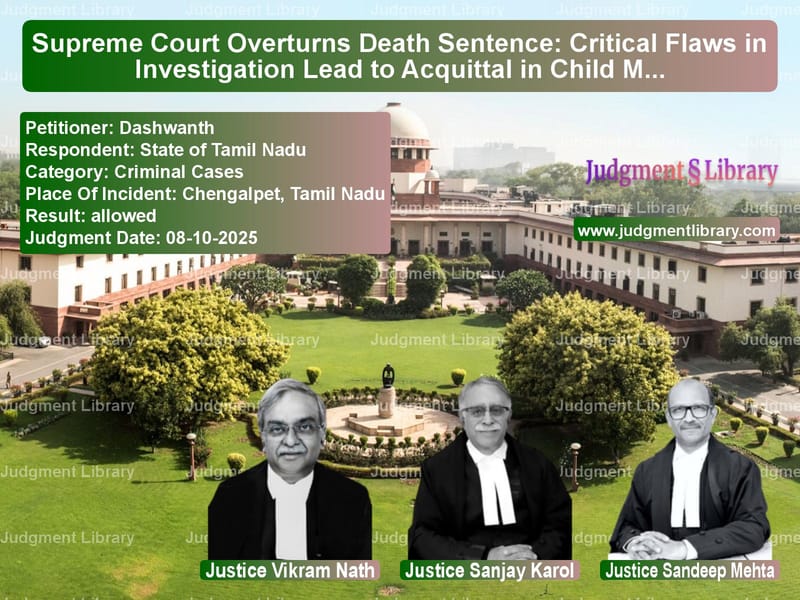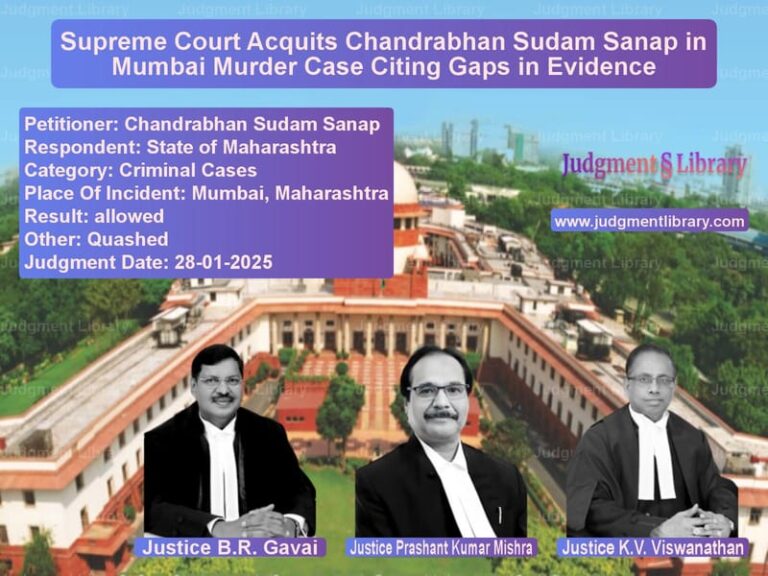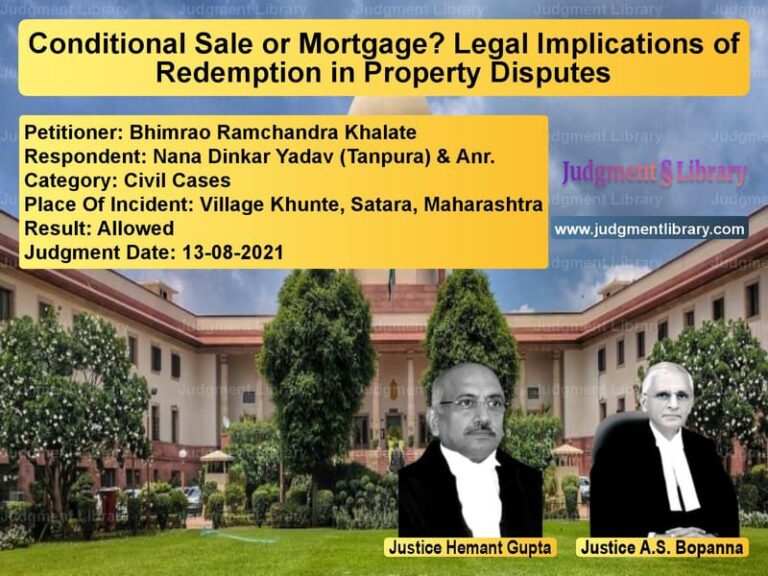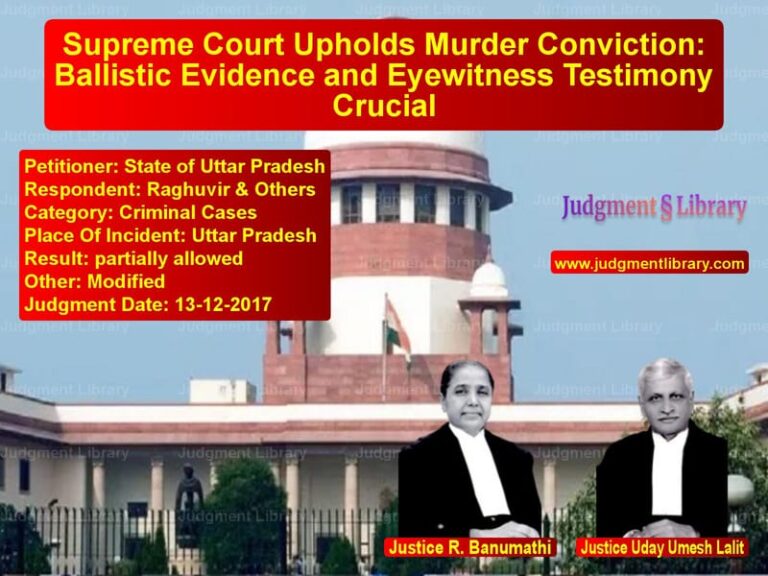Supreme Court Overturns Death Sentence: Critical Flaws in Investigation Lead to Acquittal in Child Murder Case
In a landmark judgment that underscores the paramount importance of fair trial procedures and proper investigation, the Supreme Court of India recently acquitted a man who had been sentenced to death for the alleged sexual assault and murder of a seven-year-old girl. The case, which had shocked the community and led to capital punishment from the trial court, ultimately unraveled due to multiple serious flaws in the investigation and trial process that compromised the fundamental rights of the accused.
The tragic case began on February 5, 2017, when a seven-year-old girl went missing from her home in Chengalpet, Tamil Nadu. Her parents had gone shopping and returned around 7:15 PM to find their daughter missing. An extensive search was launched with the help of neighbors, including the appellant Dashwanth, but the efforts proved fruitless. The father filed a missing person’s complaint at Mangadu Police Station around 10:00 PM the same day.
The investigation took a dramatic turn when police claimed to have reviewed CCTV footage from a nearby temple that allegedly showed suspicious movements. The needle of suspicion turned toward Dashwanth, who was arrested on February 8, 2017. The prosecution alleged that he had confessed to sexually assaulting and murdering the child, then burning her body to destroy evidence. The charred remains were recovered based on his disclosure statement.
The trial court convicted Dashwanth under multiple sections of the Indian Penal Code and the Protection of Children from Sexual Offences (POCSO) Act, sentencing him to death. The High Court confirmed both the conviction and death sentence. However, the Supreme Court found critical flaws that fundamentally undermined the entire case.
Fundamental Flaws in Trial Procedure
The Supreme Court identified serious procedural violations that denied the appellant a fair trial. The Court noted that “right from the stage of framing of the charges, the trial was conducted in a lopsided manner and without due deference to the principles of fair trial.”
The chronology revealed disturbing irregularities: charges were framed on October 24, 2017, while the appellant remained unrepresented. Only on December 13, 2017, was a legal aid counsel appointed, and copies of prosecution documents were provided. Shockingly, the prosecution evidence commenced just four days later on December 18, 2017, with 30 witnesses examined and the case concluded within one and a half months.
The Court emphasized that “the legal aid counsel appointed to defend the appellant could, by no stretch of imagination, have had a reasonable and effective opportunity to prepare the matter and conduct the cross-examination from the witnesses.”
Even more concerning was the sentencing procedure. The trial court pronounced the conviction and death sentence on the same day, February 19, 2018, without conducting the mandatory analysis of aggravating and mitigating circumstances or obtaining psychological evaluation and jail conduct reports.
Unraveling the Prosecution’s Circumstantial Case
The prosecution’s case rested entirely on circumstantial evidence, which the Supreme Court analyzed meticulously against the established legal principles from Sharad Birdhichand Sharda v. State of Maharashtra. The Court found all key circumstances unreliable.
The “last seen together” theory depended on witness Murugan (PW-3), who claimed to have seen the appellant playing with the victim on the second floor of their building between 6:00-6:15 PM. However, the Court found this testimony unbelievable because Murugan never disclosed this crucial information to the victim’s parents during the extensive search that began around 7:15 PM.
The Court observed that “Had there been an iota of truth in the version of Murugan (PW-3), he would definitely have told the complainant (PW-1) that he had seen the victim in the company of the appellant between 6:00 p.m. to 6:15 p.m. on the second floor of the building.” The witness only disclosed this information to investigators more than two months after the incident, making it appear manufactured.
Serious Investigation Lapses
The investigation displayed multiple critical failures. The CCTV footage from the temple, which the prosecution claimed showed suspicious movements, was never collected or exhibited as evidence. The investigating officer admitted in cross-examination that he “did not produce the same, as, the complainant has informed us about the accused secretly and because the face was not clearly visible in the aforesaid CCTV footage.”
The recovery of evidence based on the appellant’s disclosure statement collapsed under scrutiny. The victim’s father testified that police had informed him about the crime details on the morning of February 8, 2017, before the appellant’s alleged confession was recorded. This suggested the police already knew the facts they later attributed to the appellant’s confession.
The Court noted that “the police had already created the entire story and later on, tried to fit the same into a sequence by postponing the formal arrest of the appellant in order to implicate him in this case.”
Forensic Evidence Compromised
The forensic evidence, particularly the DNA analysis, suffered from fatal procedural flaws. The prosecution failed to establish the chain of custody of forensic samples, a fundamental requirement for scientific evidence reliability.
The Court emphasized that “the prosecution has miserably failed to prove the chain of custody of the forensic articles/samples right from the time of seizure till they reached the FSL.” The malkhana in-charge wasn’t examined, no forwarding documents were properly proved, and no witness who transported the samples was examined.
Referring to Prakash Nishad v. State of Maharashtra, the Court highlighted that “the delay in sending the samples is unexplained and therefore, the possibility of contamination and the concomitant prospect of diminishment in value cannot be reasonably ruled out.” The blood samples of the appellant were collected four months after his arrest, creating serious doubts about manipulation.
Violation of Confession Laws
The trial court permitted the investigating officer to reproduce the appellant’s entire confession in his deposition, which the Supreme Court found “in clear contravention to the mandate of Section 25 of the Indian Evidence Act, 1872.” Only the portion leading to discovery of facts is admissible, not the entire confession.
The Court strongly criticized this procedural violation, noting that “Allowing the Investigation Officer to extract the entire confession of the accused, in his evidence, apart from being grossly illegal, also have a propensity of clouding the mind of the Court while appreciating the facts and would in turn cause grave prejudice to the accused.”
Broader Implications
While acknowledging the heinous nature of the crime, the Supreme Court emphasized that legal procedures cannot be compromised even in the most distressing cases. The Court stated that “the legal framework does not permit the Courts to punish an accused person based merely on moral convictions or conjectures. Each case must be adjudicated by the Courts rigorously on its individual merits and in strict conformity with the law, without yielding to public sentiment and external pressures.”
The judgment serves as a powerful reminder that the integrity of the criminal justice system depends on strict adherence to due process and fair trial standards. The Court’s meticulous examination exposed how procedural shortcuts and investigative lapses can lead to grave miscarriages of justice, even in cases involving the most serious allegations.
This case joins a growing body of jurisprudence where the Supreme Court has intervened to protect fundamental rights, demonstrating that the ends of justice are never served by compromising the means. The judgment reinforces that in a system committed to the rule of law, every accused person, regardless of the charges they face, is entitled to a fair trial and the presumption of innocence until proven guilty beyond reasonable doubt through proper legal procedures.
Petitioner Name: Dashwanth.Respondent Name: State of Tamil Nadu.Judgment By: Justice Vikram Nath, Justice Sanjay Karol, Justice Sandeep Mehta.Place Of Incident: Chengalpet, Tamil Nadu.Judgment Date: 08-10-2025.Result: allowed.
Don’t miss out on the full details! Download the complete judgment in PDF format below and gain valuable insights instantly!
Download Judgment: dashwanth-vs-state-of-tamil-nadu-supreme-court-of-india-judgment-dated-08-10-2025.pdf
Directly Download Judgment: Directly download this Judgment
See all petitions in Murder Cases
See all petitions in Bail and Anticipatory Bail
See all petitions in Custodial Deaths and Police Misconduct
See all petitions in Attempt to Murder Cases
See all petitions in Fraud and Forgery
See all petitions in Judgment by Vikram Nath
See all petitions in Judgment by Sanjay Karol
See all petitions in Judgment by Sandeep Mehta
See all petitions in allowed
See all petitions in supreme court of India judgments October 2025
See all petitions in 2025 judgments
See all posts in Criminal Cases Category
See all allowed petitions in Criminal Cases Category
See all Dismissed petitions in Criminal Cases Category
See all partially allowed petitions in Criminal Cases Category







